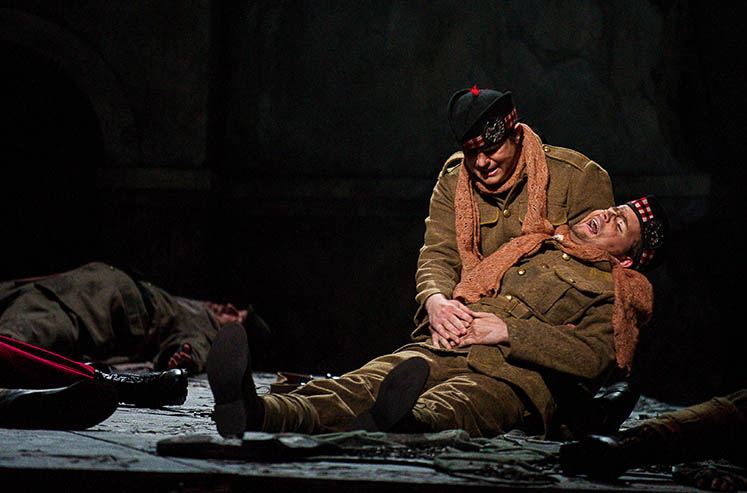Kevin Puts’ opera Silent Night is a parable of possibilities: inspired by and based upon the spontaneous and short-lived ceasefire during the first winter of World War I, the opera boldly puts forward the concept that peace is possible—and also the bitter fact that peace is forever temporary.
Fort Worth Opera continued its current quality run by presenting Texas’ first performance of this very significant work Sunday afternoon at Bass Performance Hall. Co-producing companies in Saint Paul and Philadelphia presented the work in 2011 and 2013 respectively, and it won composer Puts the Pulitzer Prize for music in 2012.
Librettist Mark Campbell provided the text for the piece, drawing on a plot and fictional (and some fictionalized) characters in Christian Carion’s 2005 film, Joyeux Noël. The history books tell us that the truce ultimately involved 100,000 troops over a length of several hundred miles. Carion telescoped the event into an interaction between French and Scottish Allied units on one hand, and a German unit on the other. The story focuses on the actions and responses of a Scottish clergyman; a French officer whose pregnant wife lives in German-occupied territory; a German opera singer; the German’s Danish fiancée (also a singer); and a strict German officer. A bagpipe tune from the Scottish unit inspires a Christmas song from the German tenor, after which peace and fraternization breaks out. The second act depicts the simple miracle of human beings at peace, inevitably deteriorating, under pressure from higher-ups, into renewed violence.
The story inspired an admirably restrained, lyrically neo-romantic, and wonderfully singable score. Puts avoids quoting familiar melodies (the tune associated with the title does not appear in the piece) or any sort of easy musical histrionics. The climactic moments are invariably accompanied by chillingly quiet, introspective music.
Structurally, the long series of short scenes in Act I feels disjointed at times, both musically and dramatically. This may have been inevitable, given the separate plot-lines that eventually weave together, just before intermission. Act II, possesses a convincing momentum, and it also contains the only fully developed aria in the work, sung by the soprano. On first hearing, it seems that a few more moments of reflection of this nature would have made Silent Night flow even more smoothly than it does.
The large cast of principals provides plenty of glory to spread around—but few opportunities for any one singer to steal the show. There are no villains here, and the heroes are emphatically human. There’s soprano Ava Pine, as the singer Anna Sorenson; tenor Chad Johnson, in his Fort Worth Opera debut as her war-weary lover Nikolaus Sprink; baritone Christopher Burchett, as the peace-loving Scottish clergyman Father Palmer; tenor Kevin Newell, as the embittered Scottish soldier,Jonathan Dale; baritone Morgan Smith, as the French Lieutenant Audebert; and baritone Craig Irvin, as the conflicted German Lieutenant Horstmayer. Irvin’s character is a Jew whose ethnicity is a deeply personal issue, and the audience is left to ponder that it will remain an issue for decades to come should he survive the war. The relatively small but noticeable role of the tragicomic French barber Ponchel, was winningly performed by baritone Steven Eddy.
Joe Illick conducted the Fort Worth Symphony in a complex and demanding score, while Octavio Cardenas’ direction constantly explores even the tiniest, meaningful detail. In one perfect example, it was the subtlety of the initial hesitance of French and German officers to shake hands as the truce falters. The sets by Francis O’Connor, on a revolving (and occasionally noisy) platform included stark, bare trees, appropriately suggesting crucifixion. Andrezj Goulding’s magnificent projections—on a scrim in front of the performers for much of the performance—complemented the drama beautifully. The moment at which the falling snow transformed into falling sheets of paper to represent the letters written home by the soldiers was particularly memorable.
The opera itself seems a likely candidate for the permanent repertoire. Or to take that even further, perhaps a thoughtful community could make Silent Night a regular Christmas season production and antidote to the banal commercialization of the holiday season. For now, only one performance of the Fort Worth production of Silent Night remains, and anyone with an interest in the possibilities and future of opera should take advantage of the opportunity to see, hear, and feel it.





